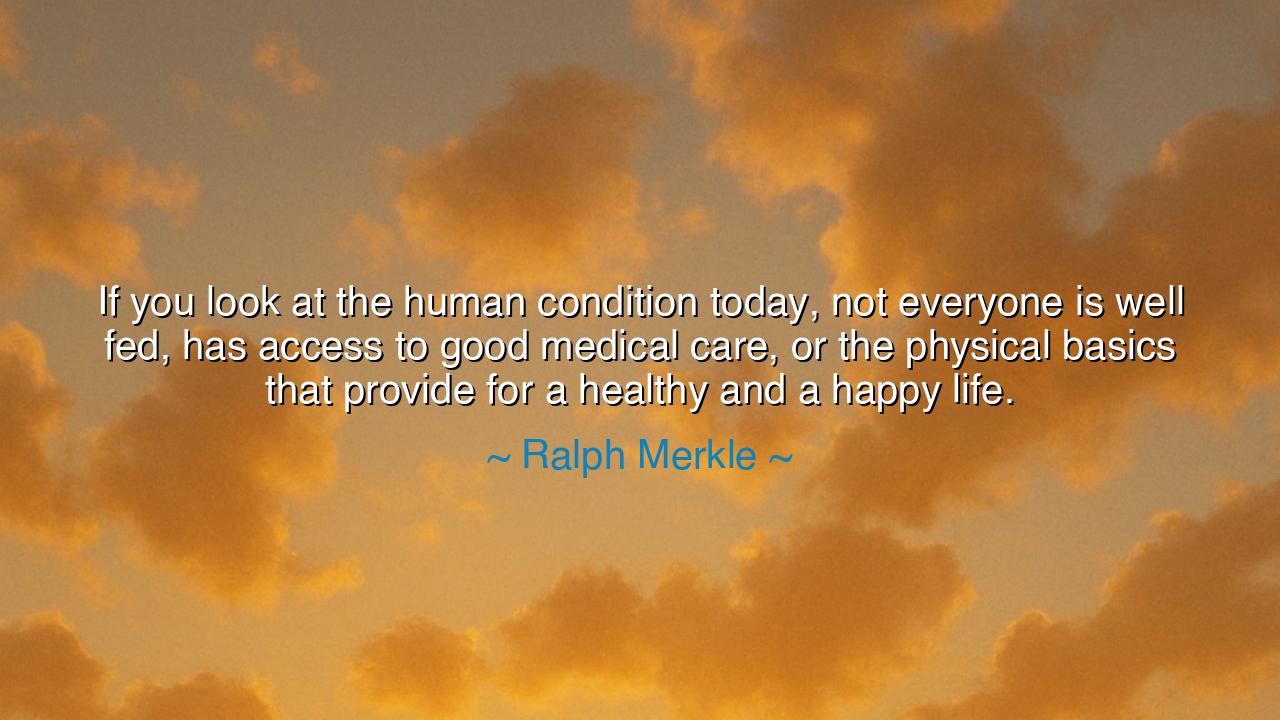
If you look at the human condition today, not everyone is well
If you look at the human condition today, not everyone is well fed, has access to good medical care, or the physical basics that provide for a healthy and a happy life.






Hear the words of Ralph Merkle, spoken not as idle commentary, but as a lament for our age: “If you look at the human condition today, not everyone is well fed, has access to good medical care, or the physical basics that provide for a healthy and a happy life.” This truth, though plain, is heavy with sorrow, for it unmasks the divide between what mankind has achieved in knowledge and wealth, and what it has yet to accomplish in justice and compassion. In an age where wonders of science abound and riches flow like rivers, still there are countless souls who hunger, who suffer without healing, who lack even the simple shelter that preserves dignity.
The human condition has always been marked by struggle. In ancient times, famine could strike like a curse, sweeping away entire villages. Plagues raged through empires, humbling kings and peasants alike. Yet today, though we wield the power of machines, medicines, and global trade, Merkle reminds us that the old afflictions still remain. The tragedy is not only that hunger and sickness endure, but that they endure amidst plenty. The earth yields enough to feed all, knowledge has crafted cures for many ailments, and yet inequality and neglect leave multitudes without hope.
Consider the tale of the Irish Potato Famine in the nineteenth century. Millions starved, not because food was absent, but because the systems of power and distribution failed them. Ships of grain left Irish ports even as families perished by the roadside. This is the very lesson Merkle points to: suffering often exists not from lack of means, but from the failure of humanity to ensure that the basics for a healthy and happy life are shared among all.
The lack of access to medical care is another shadow upon our world. Recall the days before penicillin, when infection was a death sentence. Now, medicine has advanced beyond the dreams of our ancestors, yet still children die of preventable diseases in lands where wealth does not flow. In contrast, rulers of old would summon healers from distant realms, sparing no cost to save a single life. How can it be that in an era where cures are known, millions remain beyond their reach? It is not fate, but neglect, that leaves them so.
Yet Merkle’s words are not only an indictment, but also a call to awakening. He does not deny the progress humanity has made—rather, he urges us to look beyond our comfort and see the unfinished work. For what is wealth, if not the responsibility to uplift? What is knowledge, if not the duty to heal? To turn away from the suffering of others is to betray the very essence of being human. To recognize their plight is to reclaim our shared humanity.
The lesson is clear: if we would call ourselves advanced, let us prove it not only by invention, but by compassion. It is not enough to marvel at technology or to boast of progress while neighbors starve. The true measure of a society is not the height of its towers, but how it tends to the lowliest among it. A healthy and happy life must not be a privilege of the few, but the birthright of all.
And so, let your actions follow. Give where you can give, whether bread to the hungry, time to the lonely, or support to the causes that bring healing to the forgotten. Speak for those who have no voice. Hold leaders accountable to ensure that progress lifts all, not just the privileged. In your daily walk, let gratitude stir generosity, and let awareness kindle action.
Thus remember the wisdom of Ralph Merkle: “Not everyone is well fed, has access to good medical care, or the physical basics that provide for a healthy and a happy life.” To see this truth is to feel sorrow, but also responsibility. Let this awareness not make you despair, but inspire you to be the change-bearer, so that the day may come when the human condition is not marked by lack, but by abundance shared, and by dignity for all.






AAdministratorAdministrator
Welcome, honored guests. Please leave a comment, we will respond soon